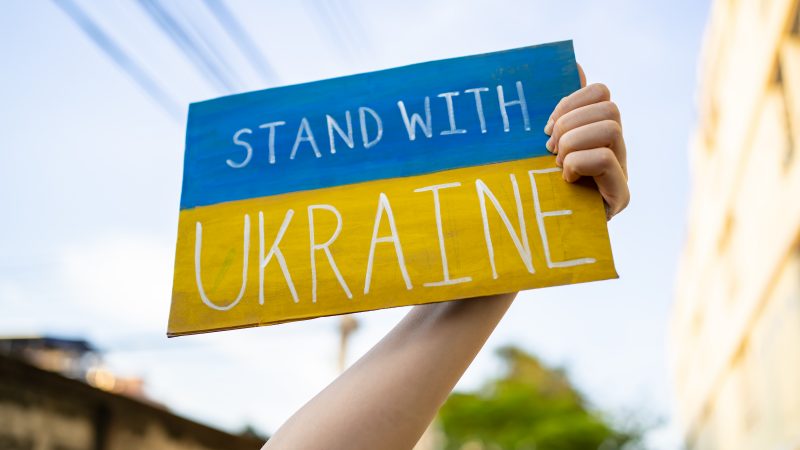
The Ukrainian people have won their first victory in their war to resist the full-scale invasion that began on February 24th. Russian forces have retreated following a humiliating and costly defeat in the Battle for Kyiv.
The tentative hopes from this success are overshadowed by the atrocities against the civilian population discovered in the newly liberated towns such as Irpin and Bucha. Mykhailo Volynets, chair of the Confederation of Free Trade Unions of Ukraine (KVPU), has appealed to the global labour movement, describing the atrocities as part of a deliberate strategy, the “bombing of hospitals and homes, executions, atrocities and rapes are part of Russian inhumane tactics”.
That Russia will not differentiate between civilians and the armed forces was made clear in a chilling paper, ‘What Russia should do with Ukraine’, which appeared in the leading RIA news on April 3rd. It stated that all “who took up arms should be destroyed to the maximum”, alongside “a significant part of the masses” who must face “just punishment”. Ukrainians know more than ever that the Kremlin not only does not recognise the legitimacy of their country to exist, but will use extreme and indiscriminate violence to achieve their goals.
In such circumstances, that the Ukrainian trade union see a threat of genocide is understandable. The KVPU have appealed, saying: “Putin’s fascist criminal regime wants to destroy the people of Ukraine and also threatens peace and stability in Europe and the world. Stand with Ukraine! Help the people of Ukraine to win in the struggle for independence”.
In response, a coalition of national trade unions have taken the initiative to show that our labour movement in the UK does stand with Ukraine. Eight trade unions, including Labour Party affiliates, the general union GMB, the train drivers’ union ASLEF, the National Union of Mineworkers (NUM), the union of transport staff TSSA, and the Communication Workers’ Union (CWU) have called a demonstration on Saturday 9th April, along with the Public and Commercial Services Union (PCS), the University and College Union (UCU), and the Bakers, Food and Allied Workers Union (BFAWU). The initiative has also won support across equally broad sections of the Labour Party, with MPs ranging from John McDonnell and Nadia Whittome to Alex Sobel and John Cryer declaring their support, amongst others.
The event is historic: it is the first time that UK unions have taken to the streets in solidarity with Ukraine, but even more importantly the demonstration is being called jointly with the Ukrainian trade union movement. The equivalent of the TUC, the two union federations – Confederation of Free Trade Unions and the Federation of Trade Unions of Ukraine – are officially supporting the demonstration. Individual unions who have been at the forefront of resisting the invasion have also added their support: the Independent Trade Union of Miners of Ukraine and the Free Trade Union of Railway Workers of Ukraine.
Two of the unions calling this demonstration defied the Home Office and joined a solidarity delegation to Ukraine; AFLEF general secretary Mick Whelan and NUM general secretary Chris Kitchen stayed until eve of the invasion, meeting an array of Ukrainian trade unions. They heard the experiences of trade unionists in the already occupied areas of Donetsk and Luhansk, where their unions are banned and activists have been murdered.
The Ukrainian labour movement knew what would come if they were occupied. The trade unions have been at the forefront in providing both humanitarian aid and organisation of armed resistance. In some areas, entire union committees have become brigades of the volunteer territorial defence forces.
Public sector workers have been crucial in maintaining essential services. In the industrial centre of Kryvyi Rih in south-east Ukraine, the miners unions have played a key role in the fortification of their city, and the transport workers have been heroic in their evacuation of civilians from areas under attack, driving trains under shellfire and using trolley buses to block advancing Russian tanks.
UK trade unions have issued an unequivocal statement of solidarity jointly with the Ukrainian trade unions. It has been published widely in English and Ukrainian, with a clear aim to show to the thousands of Ukrainians who have come to live and work in the UK that the labour movement will stand with Ukraine.
Unions stand with Ukraine
We condemn the Russian invasion of Ukraine and call for an immediate ceasefire and withdrawal of Russian troops from all of Ukraine. The Russian government’s violence has caused thousands of Ukrainian deaths and forced millions to flee their homes. We stand with the people of Ukraine in this time of their suffering.
As a trade union movement, we call for a just peace. We urge all governments to reach a negotiated solution. We send solidarity to the trade unionists of Ukraine who have been engaged in humanitarian assistance and resistance to the invasion.
We will support in whatever way we can the brave people demonstrating in Russia for an end to the war. We call on the UK government to welcome refugees seeking to come to the UK without imposing any restrictions.
To protest against the Russian invasion and show our solidarity with the people of Ukraine – jointly with Ukrainian trade unions – we are supporting a demonstration – Unions stand with Ukraine.
We urge all trade unionists, all working people, and Ukrainians who live and work in the UK to join with us.
GMB, CWU, NUM, ASLEF, TSSA, BFAWU, UCU, PCS.
Assemble at Parliament Square, noon, Saturday 9th April, London, SW1A 0AA, for the demonstration followed by a rally at Downing Street.




More from LabourList
‘Labour’s quiet quest for democratic renewal’
‘Labour promised to make work pay. Now it must deliver for young people’
‘Council Tax shouldn’t punish those who have the least or those we owe the most’